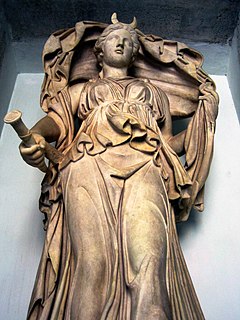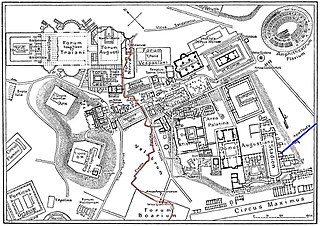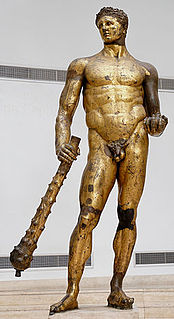Related Research Articles

Gerard Manley Hopkins was an English poet and Jesuit priest, whose posthumous fame established him among the leading Victorian poets. His manipulation of prosody – particularly his concept of sprung rhythm – established him as an innovative writer of verse, as did his technique of praising God through vivid use of imagery and nature. Only after his death did Robert Bridges begin to publish a few of Hopkins's mature poems in anthologies, hoping to prepare the way for wider acceptance of his style. By 1930 his work was recognised as one of the most original literary accomplishments of his century. It had a marked influence on such leading 20th-century poets as T. S. Eliot, Dylan Thomas, W. H. Auden, Stephen Spender and Cecil Day-Lewis.
The history of religion refers to the written record of human religious feelings, thoughts, and ideas. This period of religious history begins with the invention of writing about 5,220 years ago. The prehistory of religion involves the study of religious beliefs that existed prior to the advent of written records. One can also study comparative religious chronology through a timeline of religion. Writing played a major role in standardizing religious texts regardless of time or location, and making easier the memorization of prayers and divine rules. A small part of the Bible involves the collation of oral texts handed down over the centuries.

The Ides of March is the 74th day in the Roman calendar, corresponding to 15 March. It was marked by several religious observances and was notable for the Romans as a deadline for settling debts. In 44 BC, it became notorious as the date of the assassination of Julius Caesar which made the Ides of March a turning point in Roman history.

In ancient Roman religion and myth, Luna is the divine embodiment of the Moon. She is often presented as the female complement of the Sun, Sol, conceived of as a god. Luna is also sometimes represented as an aspect of the Roman triple goddess, along with Proserpina and Hecate. Luna is not always a distinct goddess, but sometimes rather an epithet that specializes a goddess, since both Diana and Juno are identified as moon goddesses.

Fontus or Fons was a god of wells and springs in ancient Roman religion. A religious festival called the Fontinalia was held on October 13 in his honor. Throughout the city, fountains and wellheads were adorned with garlands.
In Roman mythology Imporcitor was the deity of ploughing land with a wide furrow. He was one of the 12 helper gods of Ceres. He is also labeled as the maker of pigs. His name was invoked during the Cerealia, along with the other 11 helper gods of Ceres.
In Roman mythology and religion, Quirinus is an early god of the Roman state. In Augustan Rome, Quirinus was also an epithet of Janus, as Janus Quirinus.
In Roman mythology, Reparator was the deity of the preparing fallow land for crops. He was one of the 12 helper gods of Ceres. His name was invoked during the Cerealia, along with the other 11 helper gods of Ceres.
In Roman mythology, Saritor was the god of hoeing and weeding. His name was invoked during the Cerealia, along with the other 11 helper gods of Ceres.
In ancient Roman religion, Tempestas is a goddess of storms or sudden weather. As with certain other nature and weather deities, the plural form Tempestates is common. Cicero, in discussing whether natural phenomena such as rainbows and clouds should be regarded as divine, notes that the Tempestates had been consecrated as deities by the Roman people.
In Roman mythology, Vervactor was the deity of ploughing fallow land. He was one of the 12 helper gods of Ceres. His name was invoked during the Cerealia, along with the other 11 helper gods of Ceres.

The Cloaca Maxima was one of the world's earliest sewage systems. Constructed in Ancient Rome in order to drain local marshes and remove the waste of one of the world's most populous cities, it carried effluent to the River Tiber, which ran beside the city.

The Capitoline Triad was a group of three deities who were worshipped in ancient Roman religion in an elaborate temple on Rome's Capitoline Hill. It comprised Jupiter, Juno and Minerva. The triad held a central place in the public religion of Rome.

In Greek mythology, Aether is one of the primordial deities. Aether is the personification of the "upper sky". He embodies the pure upper air that the gods breathe, as opposed to the normal air breathed by mortals. Like Tartarus and Erebus, Aether may have had shrines in ancient Greece, but he had no temples and is unlikely to have had a cult.
Robert Everett Allen Palmer II was a historian and a leading figure in the study of archaic Rome. At the time of his death was professor emeritus of classical studies at the University of Pennsylvania.

In ancient Greek religion, an orgion was an ecstatic form of worship characteristic of some mystery cults. The orgion is in particular a cult ceremony of Dionysos, celebrated widely in Arcadia, featuring "unrestrained" masked dances by torchlight and animal sacrifice by means of random slashing that evoked the god's own rending and suffering at the hands of the Titans. The orgia that explained the role of the Titans in Dionysos's dismemberment were said to have been composed by Onomacritus. Greek art and literature, as well as some patristic texts, indicate that the orgia involved snake handling.

In ancient Roman religion and myth, Mars was the god of war and also an agricultural guardian, a combination characteristic of early Rome. He was the son of Jupiter and Juno, and he was the most prominent of the military gods in the religion of the Roman army. Most of his festivals were held in March, the month named for him, and in October, which began the season for military campaigning and ended the season for farming.

Greek mythology is the body of myths originally told by the ancient Greeks, and a genre of Ancient Greek folklore. These stories concern the origin and nature of the world, the lives and activities of deities, heroes, and mythological creatures, and the origins and significance of the ancient Greeks' own cult and ritual practices. Modern scholars study the myths to shed light on the religious and political institutions of ancient Greece, and to better understand the nature of myth-making itself.

Roman mythology is the body of traditional stories pertaining to ancient Rome's legendary origins and religious system, as represented in the literature and visual arts of the Romans. "Roman mythology" may also refer to the modern study of these representations, and to the subject matter as represented in the literature and art of other cultures in any period.

In ancient Roman religion and myth, Hercules was venerated as a divinized hero and incorporated into the legends of Rome's founding. The Romans adapted Greek myths and the iconography of Heracles into their own literature and art, but the hero developed distinctly Roman characteristics. Some Greek sources as early as the 6th and 5th century BC gave Heracles Roman connections during his famous labors.
References
- ↑ Dumézil, Georges; Krapp, Philip (1996). Archaic Roman religion (Johns Hopkins ed.). Baltimore [u.a.]: Johns Hopkins University Press. p. 35. ISBN 9780801854804.
- ↑ "A Dictionary of Greek and Roman Antiquities (1890), AGRICULTU´RA". www.perseus.tufts.edu. Retrieved 4 February 2017.
| | This article relating to an Ancient Roman myth or legend is a stub. You can help Wikipedia by expanding it. |